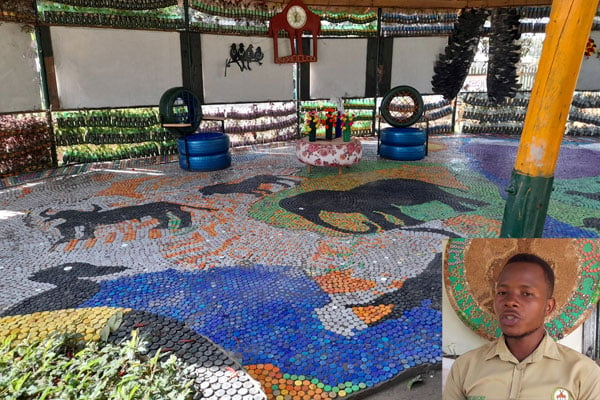Youth makes plastic recycling fashionable

Some of Julius Mwesigye (inset)'s products at Uganda Wildlife Conservation Education Centre. PHOTOS | BENJAMIN JUMBE.
What you need to know:
- The youngster told Sunday Monitor that he uses both biodegradable and non-biodegradable material. He used “the bottles to have flower vessels and the bottle tops to make the floor.”
Plastics have become a public nuisance, clogging water channels and bodies in almost equal measure.
This state of affairs has been blamed on a poor mindset around solid waste disposal.
While the issue of solid waste management is an age-old problem, Julius Mwesigye reckons he can play a telling role in addressing it.
“That idea came way back in my high school when I was president of wildlife club and I used to love things related to waste management,” Mwesigye said at Uganda Wildlife Conservation Education Centre’s waste management demonstration area, adding, “I was able to participate in the [2012] waste management campaign quiz competitions where I happened to win.”
The youngster told Sunday Monitor that he uses both biodegradable and non-biodegradable material. He used “the bottles to have flower vessels and the bottle tops to make the floor.”
The biodegradables used include “elephant dung, which, for example, we used to make our Uwec (Uganda Wildlife Conservation Education Centre) logo.”
Mwesigye also used some sand and plastics and car tyres to make chairs and old jeans as flower vessels. His end goal, he adds, is to make people appreciate that any kind of waste generated from home can be used or managed in a proper way.
The unique approach has seen Mwesigye use 500 kilogrammes of bottle tops and 250 kilogrammes of bottles. This is—by any measure—no mean feat. It also takes a lot of work. One needs to mix wet cement with sand before plastering it on the floor. You then proceed to get the bottle tops and put one by one in the plaster. Such is the painstaking process that you have to ensure that there is no space left between them.
Being a conservation and waste management champion, Mwesigye’s work fed off the three Rs—reduce, reuse and recycle.
“Waste management is a responsibility of everyone and I believe if many more institutions, including churches and schools, embrace such technology, it will go a long way in reducing these plastics from the environment,” he said.
Mwesigye harbours hopes of developing floors constructed in schools and communities in an effort to reduce plastics from the environment. He also intends to set up a plastics museum at Uwec, and appears to have the support of its executive director—Dr James Musinguzi. The concept of reducing, recycling and reusing plastics has, especially drawn sweeping approval.
“This is a deliberate effort to demonstrate that this is possible and whoever comes at the centre here in Entebbe is able to appreciate and learn about these efforts,” Dr Musinguzi told Sunday Monitor, adding, “We feel through this, we can promote positive self-conservation action towards management at individual level and later scale up to communities, as well as our homes.”
Ringing endorsements
Dr Akankwasah Barirega—the executive director of the National Environment Authority (Nema)— has also hailed the innovation, noting that it’s one of the approaches the Authority is promoting.
“We promote waste-to-energy, waste-to-fertiliser, waste-to-recycling materials, waste-to-building materials, etc. That is where the world has moved now,” Dr Akankwasah said.
At the continental level, African Environment ministers last week—having met in the Senegalese capital of Dakar from September 15 to 16 for the 18th session of the African Ministerial Conference on the Environment—in a joint declaration on plastic pollution, committed themselves to developing an ambitious and effective international legally binding instrument. The instrument has two objectives, including ending plastic pollution in all environments and creating a non-toxic and transparent circular economy for plastics.
This was in recognition of the triple planetary crises that humanity currently faces, including climate change, pollution and biodiversity loss.
The ministers also called for environmentally sound management of plastic waste, in line with the waste hierarchy. They would doubtless warm up to the little steps that Mwesigye is taking at Uwec.




